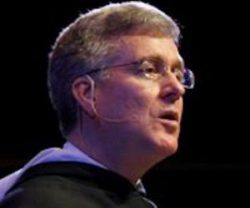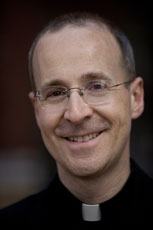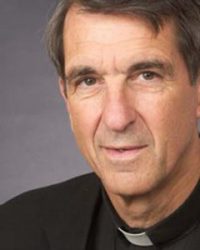Some Catholic writers pluck a favorite apple from the tree of Ratzingerian writing, and tell us why it tastes so good; what are your favorites?On the Anniversary of the ordination of Joseph Ratzinger to the priesthood, Aleteia asked a random selection of Catholic writers to share their favorite quote, or favorite book, coming from the clear mind and prolific pen of the Pope Emeritus.

Fr. Peter John Cameron, O.P., Editor, Magnificat Magazine
It is part of the mystery of God that he acts so gently, that he only gradually builds up his history within the great history of mankind; that he becomes man and so can be overlooked by his contemporaries and by the decisive forces within history; that he suffers and dies and that, having risen again, he chooses to come to mankind only through the faith of the disciples to whom he reveals himself; that he continues to knock gently at the doors of our hearts and slowly opens our eyes if we open our doors to him. — Jesus of Nazareth, Part II
I first came upon this quotation on an exhibit wall at the Knights of Columbus Museum in New Haven, Connecticut, and I remember being stunned. It’s true! Jesus, in coming to us, assumes a most subtle and understated style. He is not flashy or forceful; he does not overwhelm, does not impose himself. I was moved that Pope Benedict noticed what little the Lord did to be noticed. In his chosen method of self-revelation, Jesus shows himself to be a great risk-taker. What about the danger of being overlooked? Christ’s sure confidence is in the heart beating within his own rib cage. Certain that the human heart was made by him and for him, the modest strategy of the Son of God is one of simple wooing. As Cardinal Ratzinger, Pope Benedict reminded us that the essence of faith is that something meets us which is greater than anything we can think up for ourselves. That Something doesn’t have to hit us over the head. All the Lord need do is knock gently at the doors of our hearts. Faith, says Pope Benedict, is the finding of a You who upholds me and gives me the promise of an indestructible love. It takes a subtle mind like Pope Benedict’s to be able to plumb the subtlety of God for us. It was part of the mystery of Pope Benedict XVI that he acted so gently.

James Martin, S.J., Author of Jesus, a Pilgrimage
“We thus begin to understand the event of Cana. The sign of God is overflowing generosity. We see it in the multiplication of the loaves; we see it again and again–most of all, though, at the center of salvation history, in the fact that he lavishly spends himself for the lowly creature, man.” – Jesus of Nazareth, Part I
This may be a minority position but I believe that Pope Benedict XVI will be most remembered for three things: his superb encyclicals, his humble resignation of the office of the papacy and his magisterial book Jesus of Nazareth. For me, that last work is the fruit of his papacy for which I’m most grateful. His multi-volume Life of Christ is a magnificent meditation for all Christians and, incidentally, a great introduction for those who may know very little about Jesus. The passage quoted above is what you might call classic “Benedictine” Christology: clear, pastoral, firmly grounded in Scripture and with a bit of surprise. One often thinks of Jesus being “lavish” in his ministry, but not as often God being lavish with Jesus himself. A terrific observation. His book is filled with insights like that, and I’ve learned a great deal about Jesus from the Pope Emeritus.

Kathryn Jean Lopez, Editor-at-Large, National Review Online
First of all, I’ll forever be grateful to Pope Benedict in Light of the World, wherein he and Peter Seewald got to talking about papal resignation. And so I actually had something to say when everyone and his mother was calling me for reactions the morning of his big news in 2013!
I’m rereading Salt of the Earth: The Church at the End of the Millennium and am struck by how relevant it is today. As in marching orders.
He’s given us so much and we can go on and on. But no one has had as much of an impact on me in helping me know some of the holy men and women that have come before us and are eager to intercede for us as Pope Benedict XVI in some of his Wednesday Audiences. Ignatius press has many if not all of them in a collection called Holy Men and Women of the Middle Ages and Beyond. I think I have two copies, neither of which I can find right now. Which is fine because they’re also online. St. Anthony of Padua. John of the Cross. Catherine of Siena. Catherine of Genoa. Catherine of Bologna. Joan of Arc. Bridget of Sweden. The list goes on. I’m always struck by beauty and love with which he writes about the women, in a particular way. He’s focused on the merciful gaze of Christ in their lives and their faithfulness to Him and His gifts. I often Google his words when a feast day comes around and make rediscoveries that sometimes feel like a first meeting all over again. They bring me to tears because they help me go deeper into the Divine life with people who truly knew Him and are just long enough for an accessible mediation.
About that merciful gaze of the Father… Benedict once looked at me with what sure seemed like it. Thanks be to God for His priesthood. He is a holy father, in the Chair of Peter or out.

Thomas L. McDonald, writer
One of Pope Benedict’s key projects both before and during his pontificate was recapturing a truly Catholic Biblical criticism. Using the new analytical tools developed over the past century—but within the framework of deep tradition and living faith—he sought to forge a third way between untenable literalism and the excesses of the historical-critical method. The summit of that work is his Jesus of Nazareth trilogy, but some chips from the master’s workbench are found in a much smaller book.
“In the Beginning…”: A Catholic Understanding of the Story of Creation and the Fall not only captures the mastery of his approach to the Bible, but soars with the poetry, beauty, and heart that makes Benedict one of the greatest teachers in papal history. It’s a slim book of exactly one hundred pages, comprised of four homilies and an appendix on the theme of God the creator. We tend to be embarrassed by the early chapters of Genesis, fearing that if we look too closely at these passages the ghost of Darwin will leap from the shadows and snatch away our belief. Creation, Benedict suggests, has almost completely fallen out of catechesis, and some suspect that our shifting understanding of Genesis betrays a faith being chased into ever-shrinking boxes by new scientific discoveries.
Papa will have none of it. He recasts the Creation accounts through the powerful lens of Christology, tracing the subject beyond Genesis and into the Babylonian captivity, the wisdom literature, the psalms, and finally the New Testament. It is all of a piece, he tells us, urging a more thorough understand of the Bible based in canonical criticism. That means we don’t disassemble the Bible piece by piece and try to understand it in isolation, but view it as a totality, with each part dependent upon another, and all of it unified and fulfilled in Christ.
It’s a beautiful, moving, intellectually assertive series of talks urging us to reclaim the true meaning of God’s greatest gift: creation itself, and the revelations that unveil it for us.

Tod Worner, Blogger, Physician
To ask for a favorite quote or book written by Pope Benedict XVI is akin to asking one to do the same for G.K. Chesterton or William Shakespeare: it is an embarrassment of riches. PBXVI has the uncanny capacity to offer brilliant insights on modernity just as often as he provides profound considerations in theology. To paraphrase a favorite Chesterton quote & apply it to Pope Benedict XVI, “Benedict XVI has not been tried and found wanting; he has been found difficult and left untried.” His work is a holy trove to be read, contemplated and applied to our often distracted and disordered lives.
And so, a favorite quote of mine draws from the pope’s extraordinary 2005 homily at the opening of conclave after the death of St. John Paul II. It articulates the constant waywardness of our fallen humanity, while reminding us of the simplest answer, the purest goal, the ultimate Truth: the Person of Christ.
“We are moving towards a dictatorship of relativism which does not recognize anything as for certain and which has as its highest goal one’s own ego and one’s own desires.
However, we have a different goal: the Son of God, true man. He is the measure of true humanism. Being an ‘adult’ means having a faith which does not follow the waves of today’s fashions or the latest novelties. A faith which is deeply rooted in friendship with Christ is adult and mature. It is this friendship which opens us up to all that is good and gives us the knowledge to judge true from false, and deceit from truth. We must become mature in this adult faith.”

Katrina R. Fernandez, Columnist, Aleteia
I took it really hard when Pope Benedict abdicated. He was my first pope, my papa. As a convert I watched him take the balcony at his election as Pontiff while I was going through RCIA. It seemed his papacy was there with me every step of the way through my conversion.
Because I was so particularly saddened when he stepped down I found comfort in the book, Benedictus: Day by Day with Pope Benedict XVI by Rev. Peter J. Cameron, given to me by a close friend.
As Benedict faded from the news feeds and headlines I could easily access his wisdom and kindness from simply opening its pages. The entire book is a treasure that I re-read and go to for reference throughout the entire year, every year.

Elizabeth Scalia, Editor-in-Chief, Aleteia English Edition
My first real exposure to the mind and wisdom of Pope Benedict came shortly after his election to the papacy, when I opened up a copy of God and the World: A Conversation With Peter Seewald, and made acquaintance with lightning, barely held in check. I had always known that Cardinal Ratzinger was a towering intellect — his eyes may be deep but they snap with intelligence — but the man I encountered in those pages was not just brilliant, he was accessible. Pope Benedict possess the ability to communicate his faith, his friendship with Jesus and his stunningly instructive theological insights with a clarity and warmth that makes reading him feel like time spent with a beloved relative who has much to share and great warmth in how he shares it. Discovering that the book — a simple conversation between two men recorded over a number of days — was transcribed with only minimal edits from Ratzinger, “for clarity only” as Seewald wrote, I was a bit stunned: all of this poured out of the man in conversation, with bare editing required? Whuuuut? This speaks of wisdom that is distilled from the springs of daily prayer and contemplation — a full-on engagement with Christ and the Creator — that is almost unimaginable, yet inspiring.
Like Katrina Fernandez, I love the Benedictus book, which is a Ratzingerian feast for the mind and soul, but also for the eyes; it is put together with Magnificat’s typical attention to beauty, and it is a book I cannot do without. It was within its pages that I found this excerpt,
It is only when life has been accepted and is perceived as accepted that it becomes also acceptable. Man is that strange creature that needs not just physical birth but also appreciation if he is to subsist . . . If an individual is to accept himself, someone must say to him: “It is good that you exist” – must say it, not with words, but with that act of the entire being that we call love. – Principles of Catholic Theology
That is the sort of beautiful, true, instinctive insight that is wise and deep but completely comprehensible. You needn’t be a genius to understand this spark that is Benedict. You can open any of his writings and feel immediately like you have come into the company of that dearest grandfather, who greets you with, “hello, my dear, thank you for visiting me; it is good that you exist, now let us talk…”

Finally, a personal tribute from Father Joseph Fessio, S.J., Founder and Editor, Ignatius Press
Professor Ratzinger was my mentor and dissertation director from 1972-74. Later, when he was the ‘cardinal protector’ of Casa Balthasar in Rome, we on the board of directors met with him at least yearly. And, of course, Ignatius Press was and is the primary publisher of his books. This relationship has been one of the great blessings of my life.
Cardinal Ratzinger/Pope Benedict’s intellectual brilliance and gentle demeanor became well known to all soon after his election to the papacy. People suddenly realized that the Panzerkardinal, the Vatican Enforcer, the humorless, predatory doctrinal watchdog was in fact none of these things. Quite the opposite in fact.
It would take a full-length biography to record all that is good and holy about this exemplary man of the Church. I would like to pay tribute to him by listing his defects. It won’t take long.
He is sometimes a poor judge of character. (Accepting me as a doctoral student should be proof enough.) There are some reasons for this: Being so deeply good himself, he can be naïve about others. He sees the best in everyone and takes them at their word. He is never defensive or self-protective. And there is simply no trace of jealousy or ambition in the man.
He is ill-suited to leadership in a fast-paced, competitive commercial enterprise. And when sectors of the Church—even at the highest levels—become tainted with this spirit of the world, he is not the one to ‘clean house’.
That’s it.
Read more: 10 Pithy and Potent Quotes from Pope Benedict
When Fr. Joseph Ratzinger predicted the future of the church

